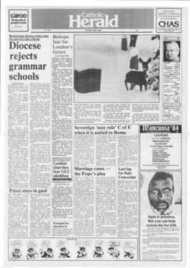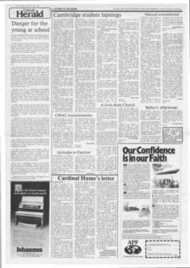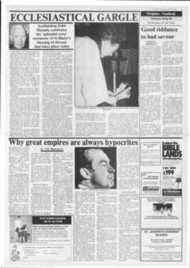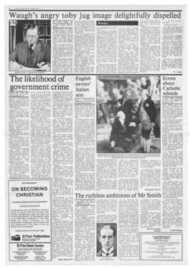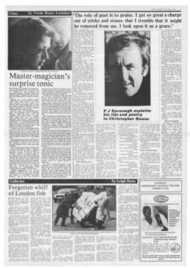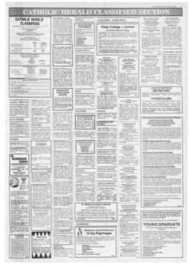Page 4, 3rd February 1984
Page 4
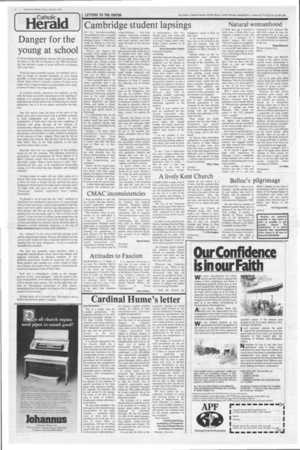
Report an error
Noticed an error on this page?If you've noticed an error in this article please click here to report it.
Tags
Share
Related articles
Lapsing 'statistics' And Religious Belief
For Some Weeks Your Columns Have Been Filled By Chaplains...
Why The Young Leave
Lapsing
Public School Lapsing Scandal
Cambridge student lapsings
AS the misunderstandings surrounding my report on public school lapsation at Cambridge continue to grow, I think that it would be helpful to issue this explanation of what 1 said and what I meant.
Firstly, my figures are accurate. Every student at the Cambridge Chaplaincy Masses on the First Sunday of the new academic year, during a pause between the Gospel and the Homily, fills in a name-collegeaddress-school-subject card. So I know with complete accuracy who was at Mass at the Chaplaincy on that Sunday.
1 have consulted most of the clergy concerned, and I am certain that no students would have been at Mass in the two suburban parishes (Cherry Hinton & Chesterton), probably none al the small Catholic communities at St Edmund's House, Blackfriars and Benet House, and 'about a dozen' (according to the parish priest), at the main parish church in Hills Road.
It is improbable that, on the First Sunday of term, any student would have gone home for the weekend, having only just arrived in Cambridge on the previous Tuesday.
Second, I do know from confidential corroborative
information that those headmasters who have claimed to 'know' that their Old Boys were at Mass are, in fact, mistaken.
Third, as my figures are valid I can only conclude that the motive behind attacks on their accuracy is defensiveness. This I find disappointing, and scandalous.
Fourth, all the excuses given for the public schoolboys who were absent from Mass would equally well apply to non-Public Schoolboys (students need to go through a period of doubt before growing into mature faith . . broken homes and materialistic parents can counteract any
school influence . . . sixth form religious education syllabuses are full of comparative religion and social concern, and don't teach the basics of the one true faith ...) Fifth, I am making one point, and one point only. Eight out of 37 possible First Year Public Schoolboys were at Mass on 10 October 1982. That is 22pc. 108 out of 228 first year non-boys' Catholic public school products were at Mass. That is 47pc.
Sixth, I am aware that 37 is a small sample compared with 228. But there was a variation of only two in the Mass-attending behaviour of those 37 students the following year (9 October 1983).
And I do know, from three years at the Chaplaincy, how few are the Catholic Public Schoolboys who take arty part or show any initiative in Catholic or Christian worship or action in the town or university. And my predecessor will bear me out. If it were only a fluke result at one Mass, would I be making this fuss!
Seventh, the figures are not significantly different if we omit girls from the reckoning. Eight out of 37 possible public schoolmen were at Mass (22pc), 45 out of 110 possible nonpublic schoolmen were at Mass (41pc).
Finally, public schoolboys and the non-public school students come from the same generation, with broken homes and materialistic parents in common, with adolescent rebellion and finding their own feet as a common phenomenon, with trendy and clesupernaturalised religious teaching in common.
It doesn't matter how we define lapsation or whatever we decide are its causes. Because I
am using the same criterion to assess it, across the entire
spectrum of the whole 18/19 year old intake, I am comparing like with like. And this is the fact: that on their first Sunday of independence, their first Sunday away from home and school only 2 Public Schoolboys in 10 went to Mass, while 5 nonPublic School students in 10 went to Mass.
Dom Christopher Jenkins University Chaplain,
Cambridge
HAVING followed with growing indignation the recent correspondence over the absence at Sunday Mass which may, or may not, be prevalent among Catholic undergraduates, and found these letters, with few exceptions, rather ignorant and patronising (as welltas based on (inaccurate) statistics on only a handful of students), I turned to Dom Alberic Staepoole's article with increased scepticism. However, apart from its appalling headline concerning 'lapsing among schoolboys', I thought it a sympathetic anti interesting approach to the problem.
Those of your readers who have not considered the fact should remember that Cambridge undergraduates are no longer 'schoolboys' but fullygrown adults who, though younger and clearly much less experienced than their seniors, deserve some respect, all the same.
I do not consider it very courteous to them to discuss their individual Sunday habits in such detail, and would be justly annoyed if the same was done to me.
In fact. I fail to understand how such a lengthy debate has continued apparently without anyone asking the young men themselves what is wrong — they do have a voice and certainly in the case of Cambridge students, enough intelligence surely to back up their case!
In the enormous progress we have seen in the Church in the past two decades, with the liturgical changes has come an emphasis on Man's freedom of choice.
Nobody wishes to see reestablished such outdated practices as endless rote learning of the catechism: the Church's educational programme must now concentrate on guiding, rather than pushing, young people towards the right choice. by communicating with them in realistic terms, rather than the penny-catechism language used before. This guidance and communication involves all members of the community, not just teachers and chaplains.
Unfortunately the frequent lack of such communication between generations is only worsened by the total omission of articles in your paper itself dealing with the activities, problems and gatherings of the 'other Church'.
Many people are totally unaware that far from being a misguided and lapsed generation. Catholic youth today plays an increasingly active role in the liturgy and in the local parish.
As long as older generations condescend to young people in this Church of today without listening to their voice, even when they show so clearly their love of the faith despite all their difficulties with it, disillusioned students will continue to lapse — and the hope of tomorrow will be put in jeopardy.
Miss C State Crawley, West Sussex.
blog comments powered by Disqus


